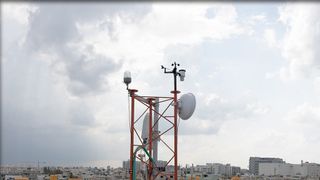Wifi Dabba is a Bangalore startup that’s challenging conventional ISPs
By using lasers instead of fibre!

In a time when our reliance on being connected is at an all-time high, our broadband connections haven’t really evolved at the same pace. Wifi Dabba aims to change that by removing the underground fibre from the equation and moving to lasers to provide internet to a city.
India has only about 20 million broadband connections, which amounts to a minuscule 7% penetration. Some of the reasons for that are slow and unreliable speeds, high downtimes, expensive setups and a lack of options. Wifi Dabba’s approach involves implementing a Free-space Optical (FSO) Communication that involves using light beams to transmit data — similar to how Starlink satellites communicate with each other.
Three years into development, it uses a grid of lasers that have a throughput of over 20gbps and can travel for 20 km with ease. Since no underground cabling is needed, its network is 50 times cheaper than conventional internet service providers. Moreover, it also reduces the need for permissions, digging and other legalities, which are the actual cost drivers.
A single plan is offered which costs Rs 799 a month for 1gbps speeds and no FUP limit. A free Wi-Fi router is also included. The Wifi Dabba network also acts as a mesh, allowing subscribers to roam through the city without losing access to gigabit internet.
Over the last 12 months, the company has onboarded more than 40,000 users as a part of the beta program. The company claims that its rooftop router approach has recorded an uptime of over 99%.

For its further expansion, Wifi Dabba has launched a partnership program, where individuals can own part of the network by buying a Point Of Presence, where the company will take care of the installation, maintenance, sales and customer support. A 4 sq km region is priced at $20,000, but the service can start after a $1,000 down payment and the rest can be paid overtime. 30% of the revenue generated will be shared along with a guaranteed minimum rate of return.
“The Wifi Dabba master plan is simple. Step one, build cheaper broadband distribution technology. Step two, Prove the tech works by connecting 1M people in a city. Step 3, Deploy to over 5,000 cities across the developing world” shared Shubhendu Sharma, COO at Wifi Dabba.
Get daily insight, inspiration and deals in your inbox
Get the hottest deals available in your inbox plus news, reviews, opinion, analysis and more from the TechRadar team.
Aakash is the engine that keeps TechRadar India running, using his experience and ideas to help consumers get to the right products via reviews, buying guides and explainers. Apart from phones, computers and cameras, he is obsessed with electric vehicles.
Most Popular





